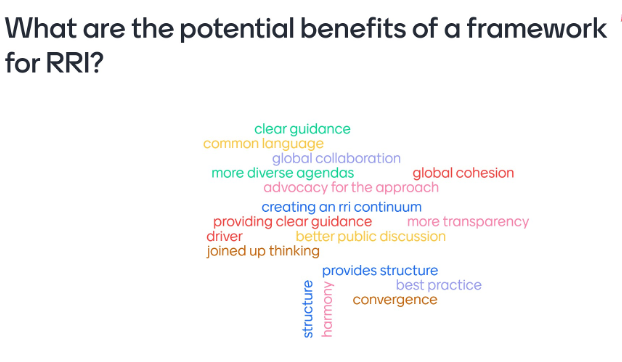The RRING network, the NewHoRRIzon and the ORION Open Science project held an online roundtable on 3 September, as part of the Euroscience Open Forum 2020, on ”Joining forces for a global 21st century Responsible Research and Innovation Network”. We are now inviting you to get involved and have your say!

The purpose of the session was to consider the number of projects and initiatives that are currently operating in this area and the need for a global network that marshals the shared experience from EU funded projects and other important initiatives internationally. The session discussed how developing a network for RRI will make the most of existing know-how, results and impacts whilst ensuring that a sustainable vision for RRI is global. It also considered a framework for RRI and what the challenges and benefits of this would be.
Potential benefits of a global RRI network
The roundtable was chaired by Dr Gordon Dalton, RRING Project Coordinator, MaREI University College Cork, and featured initial presentations from Dr Erich Griessler – NewHoRRIzon project, University of Vienna, and Maria Hagardt – ORION Open Science project, VA. All three projects are funded under the SwafS programme of Horizon 2020. It was followed by an interactive discussion chaired by Emma Day, Vitae, utilising an online voting tool to prompt panel discussion. The panel consisted of John Crowley, UNESCO, Marion Boland, Science Foundation Ireland, Jessica Wyndham, AAAS and Gail Cardew, EUROSCIENCE.

The discussion was centred around RRI frameworks and RRI networks. The attendees were able to give their views to the expert panel by using the online tool.
First, the idea of a global network was much appreciated:
- A global RRI network would have a positive impact
- A global RRI network should have tangible benefits, including a communications platform or a mechanism for knowledge transfer, of least importance is networking without purpose
- There are several benefits to a RRI framework, including advocacy for the approach and providing clear guidance – barriers and benefits must be connected
- An RRI network should promote lobbying for and legitimisation of RRI and metrics for measuring impact.
However, there are still challenges ahead:
- There remains a divide in how familiar people are with RRI – 31% of the roundtable participants did not know anything yet, whilst only 6% felt they were experts.
- RRI is felt to be more of a priority for individuals than for departments or institutions.
- RRI is felt to be more of a priority internationally than nationally, possibly reflecting the success of the EU in promoting Europe-wide RRI initiatives
- Lack of incentives and the current research culture may hinder individuals engaging with RRI
Get involved and have your say!
As a result of the discussion, the RRING team are keen to seek wider perspectives on this topic. They therefore encourage representatives of all stakeholders to click here and participate in a short online survey.
Do you want to become a member of a new global RRI community? The RRING team are inviting all stakeholders to participate in a six-month trial of an RRI global network. Get involved and join here!
For more information about the RRING EU project, have a look at the project website or get in touch with Maria Hagardt, Project Manager for ORION Open Science project.
